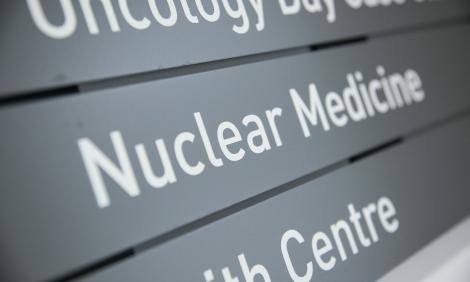Nuclear medicine
Doctors in nuclear medicine use radioactive substances to examine, diagnose and treat patients with life-threatening or chronic conditions.
You’ll be hospital-based and often integrated with colleagues in radiology and/or oncology departments.
Life as a doctor in nuclear medicine
In a typical week, you can expect to manage clinical reporting sessions, multidisciplinary team meetings and prepare and review patients for nuclear medicine tests and therapies. You may also have a general medicine or radiology commitment including on call.
You’ll enjoy a varied role as a nuclear medicine doctor, caring for people of all ages and across a range of pathology including cardiology, oncology and neuropsychiatry.
Newer techniques may combine nuclear medicine imaging techniques such as single photon emission tomography (SPECT) and positron emission tomography (PET) with computerised tomography (CT) in what is known as hybrid imaging combining physiology and structure.
Common procedures and interventions include:
- positron emission tomography (PET) imaging in oncology, cardiology and infective disease (disease capable of causing infection) - widely used for the staging, response assessment and evaluation of recurrence in a variety of cancers
- bone scanning - assessing bone metabolism - routinely used in the staging of a variety of cancers, and also has a role in other bone pathologies
- ventilation and perfusion lung imaging, using two imaging agents in succession, to make the diagnosis of pulmonary embolus (lung clot)
- myocardial perfusion imaging (an imaging test that shows how blood is flowing through the heart). Differences in blood flow between a rest state and a stressed state provide information about the heart's blood supply
- kidney imaging, to evaluate kidney scarring and drainage as well as renal transplant function
- sentinel node imaging (to assess lymphatic drainage of a tumour), where a tracer is injected into a tumour to identify the draining lymph nodes. This technique is used in a variety of cancer types to guide surgery
- accurate measurement of glomerular filtration rate (kidney filtration), which is used to calculate dosage of potentially harmful chemotherapy agents
- imaging and non-imaging tests to look at the function of the gut and liver
- using imaging techniques to identify the source of sepsis
- imaging degenerative brain diseases
How much can I earn?
You’ll first earn a salary when you start your foundation training after medical school. Find out details of current salary ranges for foundation and specialty training, SAS doctors and consultants on the Pay for doctors page.How about the benefits?
- make a difference
- flexible and part-time working
- high income early in your career
- work anywhere in the world
- excellent pension scheme
- good holiday entitlement
- NHS discounts in shops and restaurants
Must-have skills
- excellent communication skills to manage a wide range of relationships with colleagues, and patients and their families
- emotional resilience, a calm temperament and the ability to work well under pressure
- teamwork and the capacity to lead multidisciplinary teams
- problem-solving and diagnostic skills
- outstanding organisational ability and effective decision-making skills
- first-class time and resource management for the benefit of patients
Entry requirements
Your first step is medical school. Typically, you’ll need excellent GCSEs and three A or A* passes at A level including chemistry for a five-year undergraduate degree in medicine. Many medical schools also ask for biology and others may require maths or physics.If you already have a degree, you could study for a four-year postgraduate degree in medicine.
You’ll need to pass an interview and admissions test. You’ll be asked to show how you demonstrate the NHS values such as compassion and respect.
Some medical schools look to recruit a mix of students from different backgrounds and geographical areas, so your educational and economic background and family circumstances could be considered as part of your application.
What are my chances of starting a career as a doctor in nuclear medicine?
In 2021, there were 63 consultants in nuclear medicine in NHS England. In addition, there were 16 applications for three specialty training places.How to become a doctor in nuclear medicine
After medical school, you’ll join the paid two-year foundation programme where you’ll work in six placements in different settings.After your foundation programme, you can apply for paid specialty training to become a doctor in nuclear medicine, which will take a minimum of eight years which include two years in an acute specialty and six years training in both radiology and nuclear medicine.
You may be able to train part time, for example for health reasons or if you have family or caring responsibilities.
Where a career as a doctor in nuclear medicine can take you
You could:- specialise or conduct research
- teach medical students or postgraduate students in training
- get involved in research at universities, the NHS or private sector
-
These organisations have further information about being a doctor in nuclear medicine, particularly as your career progresses. Take a look.
Royal College of Physicians of Edinburgh
Royal College of Physicians and Surgeons of Glasgow
British Nuclear Medicine Society
British Nuclear Cardiology Society
European Association of Nuclear Medicine
Society of Nuclear Medicine and Molecular Imaging
American Society of Nuclear Cardiology
And hear from Dr Dave Colville who's already working in nuclear medicine.





